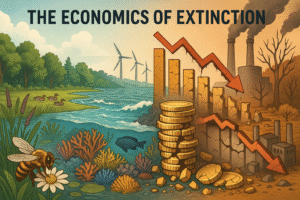Welcome to the seventh blog of our series – “Sustainable Business: Emerging Markets Lead the Way.”
Dive into the vibrant heart of an emerging economy, and you’ll find a burgeoning movement that’s as green as it is groundbreaking. Here, amidst the hustle and bustle of innovation and commerce, a significant shift is taking place. Businesses, both big and small, are turning their gaze towards sustainability, integrating practices that not only promise economic growth but also care for the planet and its people.
This transformation is not just a trend; it’s a response to the global call for action on environmental issues, recognizing that long-term success hinges on harmonizing business goals with ecological and social responsibility. As we embark on this exploration, we’ll uncover the myriad ways in which emerging markets are leading the charge, championing sustainability as the new norm for business excellence and resilience.
Understanding Sustainability in Business
Sustainability in the business context goes beyond mere green initiatives; it’s a comprehensive approach that balances economic growth with environmental stewardship and social equity. Often called the triple bottom line, this framework urges companies to extend their accountability beyond financial profits to include their impact on the planet and people.
![]()
Sustainable businesses strive to operate in ways that are not only economically viable but also environmentally friendly and beneficial to the community. This includes everything from reducing carbon footprints and conserving resources to ensuring fair labor practices and contributing to local development. By adopting sustainable practices, businesses not only mitigate their environmental impact but also unlock new opportunities for innovation, enhance their brand value, and build a loyal customer base committed to ethical consumption.
In emerging economies, where the stakes and potential for impact are particularly high, integrating sustainability into business models is becoming a crucial strategy for navigating the complexities of global markets and securing a sustainable future.
Case Studies: Pioneering Sustainable Practices
In the vibrant tapestry of emerging economies, a series of groundbreaking case studies illuminate the path towards sustainability. Take, for instance, a renewable energy project in Brazil that harnesses the power of the sun and wind to light up thousands of homes, drastically reducing reliance on fossil fuels. In India, an upcycling startup transforms textile waste into fashionable apparel, challenging the fast fashion industry’s norms and reducing environmental impact.

 Another inspiring example comes from Kenya, where EcoPost uses plastic waste to manufacture durable building materials, tackling the dual issues of waste management and deforestation. These companies flourish economically and generate beneficial impacts on society and the environment. Their success stories demonstrate the feasibility of integrating sustainability into business models, serving as beacons for others to follow.
Another inspiring example comes from Kenya, where EcoPost uses plastic waste to manufacture durable building materials, tackling the dual issues of waste management and deforestation. These companies flourish economically and generate beneficial impacts on society and the environment. Their success stories demonstrate the feasibility of integrating sustainability into business models, serving as beacons for others to follow.
Challenges of Adopting Sustainable Practices
Despite the clear benefits, businesses in emerging markets often encounter significant hurdles when striving to adopt sustainable practices. The initial costs can be daunting; implementing green technologies or switching to renewable energy sources requires an upfront investment that not all businesses can afford. Additionally, the availability of green technologies is not always widespread, presenting logistical challenges.

Skills gaps present another obstacle, as the workforce may lack the necessary training for green jobs or sustainable business operations. Moreover, the regulatory environment can be either a hindrance or insufficiently developed to support sustainable initiatives, leaving businesses navigating a complex web of compliance without clear benefits.
Yet, these challenges are not insurmountable. With creativity, community support, and a willingness to invest in the long-term benefits of sustainability, businesses can overcome these barriers, paving the way for a greener future and setting a precedent for others in their industry and beyond.
The Role of Innovation and Technology
Innovation and technology are the driving forces behind the successful integration of sustainability into business models, especially in emerging markets. Innovations in green technology, such as renewable energy sources, efficient waste management systems, and sustainable materials, enable businesses to reduce their environmental footprint and operational costs.

Technologies like blockchain for transparent supply chains and AI for optimizing resource use not only support environmental goals but also open new avenues for growth and competitiveness. Embracing these innovations allows companies to stay ahead in a rapidly changing global market, making sustainability a cornerstone of their long-term strategy.
The Impact of Government Policies and Global Partnerships
Governments play a crucial role in shaping the business landscape towards sustainability. Policies that incentivize green practices, such as tax benefits for renewable energy use, regulations that enforce environmental standards, and funding for research in sustainable technologies, create an enabling environment for businesses to adopt sustainable models.

Furthermore, global partnerships and agreements on climate action and sustainability goals encourage cross-border collaboration, sharing of green technologies, and alignment of standards, fostering a worldwide movement towards sustainability. These collaborative efforts enhance the scalability of sustainable practices, driving systemic changes across industries and economies.
Looking Ahead: The Future of Sustainable Business
The trajectory of sustainable business practices in emerging economies points towards a future where economic growth and environmental stewardship go hand in hand. Advancements in technology, along with supportive government policies and international cooperation, are paving the way for a new era of business that prioritizes sustainability as a key to resilience and success.
As consumer awareness and demand for eco-friendly products continue to rise, businesses will increasingly see sustainability as a competitive advantage. The future of sustainable business is not just about mitigating environmental risks but about seizing opportunities to innovate, lead, and thrive in a green economy. This shift towards sustainability promises not only to safeguard our planet but to usher in a new wave of prosperity and inclusivity for future generations.
Author’s Note
This exploration into sustainable business practices across emerging economies is a testament to the power of innovation and resilience. As we move forward, let’s embrace the opportunities to build a more sustainable world, together.
G.C., Ecosociosphere contributor.
Further Reading and References:





Comments
Your point of view caught my eye and was very interesting. Thanks. I have a question for you.
Thanks for sharing. I read many of your blog posts, cool, your blog is very good.
Thanks for sharing. I read many of your blog posts, cool, your blog is very good.
Your point of view caught my eye and was very interesting. Thanks. I have a question for you.